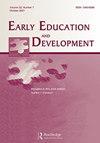A Validation Study of the Assessing Classroom Sociocultural Equity Scale (ACSES) in Pre-Kindergarten to Third Grade Classrooms
IF 2.1
3区 教育学
Q1 EDUCATION & EDUCATIONAL RESEARCH
引用次数: 3
Abstract
ABSTRACT Research Findings: Despite widespread calls to advance equity in early childhood classrooms, there are few observational measures of equitable classroom processes that can be used for academic research or professional development for teachers. In this study, we investigate the psychometric properties of an observational measure of equitable sociocultural interactions, the Assessing Classroom Sociocultural Equity Scale (ACSES 2.0). Videos (n = 348) were coded from Pre-Kindergarten to third-grade classrooms in an urban city in the Midwest. Descriptive results indicated that teachers rarely engaged in instructional activities focused on racial equity or fairness and infrequently connected lessons to children’s home lives. ACSES showed convergent validity with a widely used measure of teacher–child interactions, the CLASS. Specifically, higher levels of Inequitable Discipline predicted higher levels of CLASS Negative Climate (r(138)=.359, p < .01), and higher levels of Inequitable Discipline predicted lower scores across all other CLASS dimensions. Exploratory factor analysis supported a seven-factor solution for ACSES. Practice or Policy: The results support the usage of ACSES in Pre-Kindergarten and early elementary settings. The implications of ACSES for both research and practice are discussed.学前班至三年级课堂社会文化公平量表评估的验证研究
摘要研究发现:尽管人们普遍呼吁提高幼儿课堂的公平性,但很少有关于公平课堂过程的观察指标可用于教师的学术研究或专业发展。在这项研究中,我们调查了公平社会文化互动的观察性测量的心理测量特性,即评估课堂社会文化公平量表(ACSES 2.0) = 348)被编码为从幼儿园前到三年级的教室。描述性结果表明,教师很少参与以种族公平或公平为重点的教学活动,也很少将课程与儿童的家庭生活联系起来。ACSES与一种广泛使用的师生互动测量方法CLASS显示出收敛有效性。具体而言,不公平纪律水平越高,阶级负面气候水平就越高(r(138)=.359,p < .01),而更高水平的不公平纪律预测在所有其他课堂维度上的得分更低。探索性因素分析支持ACSES的七因素解决方案。实践或政策:研究结果支持在幼儿园前和小学早期使用ACSES。讨论了ACSES对研究和实践的启示。
本文章由计算机程序翻译,如有差异,请以英文原文为准。
求助全文
约1分钟内获得全文
求助全文
来源期刊

Early Education and Development
Multiple-
CiteScore
5.50
自引率
10.30%
发文量
78
期刊介绍:
Early Education and Development (EE&D) is a professional journal for those involved in educational and preschool services and research related to children and their families: early education supervisors, school psychologists, daycare administrators, child development specialists, developmental and child clinical psychologists, and special education administrators. It is designed to emphasize the implications for practice of research and solid scientific information. The age range focused upon is preschool through the primary grades. EE&D is a connecting link between the research community in early education and child development and school district early education programs, daycare systems, and special needs preschool programs.
 求助内容:
求助内容: 应助结果提醒方式:
应助结果提醒方式:


